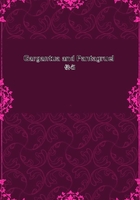
第387章
How we came to the land of Satin.
Having pleased ourselves with observing that new order of Semiquaver Friars, we set sail, and in three days our skipper made the finest and most delightful island that ever was seen. He called it the island of Frieze, for all the ways were of frieze.
In that island is the land of Satin, so celebrated by our court pages. Its trees and herbage never lose their leaves or flowers, and are all damask and flowered velvet. As for the beasts and birds, they are all of tapestry work. There we saw many beasts, birds on trees, of the same colour, bigness, and shape of those in our country; with this difference, however, that these did eat nothing, and never sung or bit like ours; and we also saw there many sorts of creatures which we never had seen before.
Among the rest, several elephants in various postures; twelve of which were the six males and six females that were brought to Rome by their governor in the time of Germanicus, Tiberius's nephew. Some of them were learned elephants, some musicians, others philosophers, dancers, and showers of tricks; and all sat down at table in good order, silently eating and drinking like so many fathers in a fratery-room.
With their snouts or proboscises, some two cubits long, they draw up water for their own drinking, and take hold of palm leaves, plums, and all manner of edibles, using them offensively or defensively as we do our fists; with them tossing men high into the air in fight, and making them burst with laughing when they come to the ground.
They have joints (in their legs), whatever some men, who doubtless never saw any but painted, may have written to the contrary. Between their teeth they have two huge horns; thus Juba called 'em, and Pausanias tells us they are not teeth, but horns; however, Philostratus will have 'em to be teeth, and not horns. 'Tis all one to me, provided you will be pleased to own them to be true ivory. These are some three or four cubits long, and are fixed in the upper jawbone, and consequently not in the lowermost. If you hearken to those who will tell you to the contrary, you will find yourself damnably mistaken, for that's a lie with a latchet; though 'twere Aelian, that long-bow man, that told you so, never believe him, for he lies as fast as a dog can trot. 'Twas in this very island that Pliny, his brother tell-truth, had seen some elephants dance on the rope with bells, and whip over the tables, presto, begone, while people were at feasts, without so much as touching the toping topers or the topers toping.
I saw a rhinoceros there, just such a one as Harry Clerberg had formerly showed me. Methought it was not much unlike a certain boar which I had formerly seen at Limoges, except the sharp horn on its snout, that was about a cubit long; by the means of which that animal dares encounter with an elephant, that is sometimes killed with its point thrust into its belly, which is its most tender and defenceless part.
I saw there two and thirty unicorns. They are a curst sort of creatures, much resembling a fine horse, unless it be that their heads are like a stag's, their feet like an elephant's, their tails like a wild boar's, and out of each of their foreheads sprouts out a sharp black horn, some six or seven feet long; commonly it dangles down like a turkey-cock's comb. When a unicorn has a mind to fight, or put it to any other use, what does it do but make it stand, and then 'tis as straight as an arrow.
I saw one of them, which was attended with a throng of other wild beasts, purify a fountain with its horn. With that Panurge told me that his prancer, alias his nimble-wimble, was like the unicorn, not altogether in length indeed, but in virtue and propriety; for as the unicorn purified pools and fountains from filth and venom, so that other animals came and drank securely there afterwards, in the like manner others might water their nags, and dabble after him without fear of shankers, carnosities, gonorrhoeas, buboes, crinkams, and such other plagues caught by those who venture to quench their amorous thirst in a common puddle; for with his nervous horn he removed all the infection that might be lurking in some blind cranny of the mephitic sweet-scented hole.
Well, quoth Friar John, when you are sped, that is, when you are married, we will make a trial of this on thy spouse, merely for charity sake, since you are pleased to give us so beneficial an instruction.